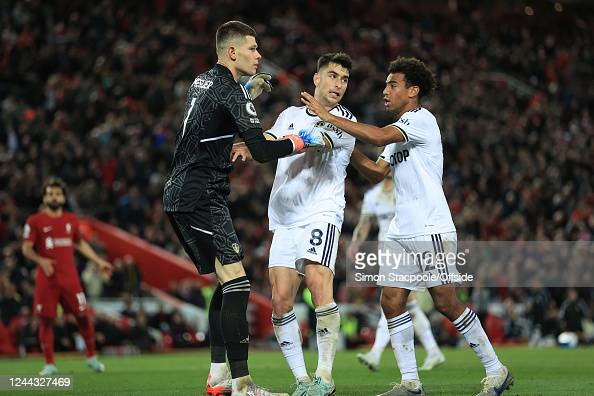Leeds United had taken an early lead when Rodrigo Moreno raced onto Joe Gomez’s loose back-pass and slotted into the empty net in the fourth minute.
Mohamed Salah levelled 10 minutes later with a well-taken volley from Andy Robertson's cross but a largely sloppy Liverpool were unable to genuinely maintain momentum from there.
There were chances for both teams either side of half-time, in a contest that was played at a significant intensity, but several excellent saves by Illan Meslier and Leeds’ continued energy gave them the platform to strike the winner late on.
Summerville took it brilliantly, after substitutes Patrick Bamford and Wilfried Gnonto combined smoothly, to earn Marsch’s team their first away win of the season, lift them from 19th to 15th in the table and leave the hosts ninth.
-
Liverpool lament further carelessness
The mix-up between Gomez and Alisson Becker that Rodrigo capitalised on to open the scoring was the clearest example on this front.
It did, admittedly, follow a good piece of defending by the centre-back and was slightly unfortunate – but undeniably costly – in its nature.
It also came shortly after a piece of early miscommunication between Meslier and Liam Cooper, which almost led to Salah scoring inside the first minute.
Still, that opening goal was a moment that somewhat set the tone for much of Liverpool’s performance.
There was a distinct lack of rhythm and coherence in much of their play, while Leeds were first onto a considerable number of second balls.
Sloppiness, in different forms, persisted throughout.
Even if it did come only 72 hours or so after their 3-0 success at Ajax stylishly secured a place in the Champions League round of 16, this showing was somewhat reflective of much of the Reds' season so far – particularly in the Premier League.
Partly, though, what made these features so stark was the degree to which they contrasted with the traits that Klopp’s side have so often emitted in recent years.
Traits that helped ensure this was their first Anfield defeat in any competition since 8th March, in the Premier League since 7th March 2021 and in the Premier League in front of a crowd since 23rd April 2017.
It was also Virgil van Dijk’s first league defeat at Anfield since he joined Liverpool in January 2018.
That’s quite the set of numbers to have built up. Numbers that are rare, and are very much worthy of admiration.
An evening that provided a reminder of just how high standards have been. That offered another marker of how those standards have dropped.
That, perhaps most importantly, posed questions as to how such standards can again be hit and retained.
-
Reds lack rhythm, but still create chances
While there was a disjointed feel to much of the Reds’ work, it ought to remain a point of some encouragement that they did still create chances to win the game. The fact that the superb Meslier made nine saves over the course of the evening highlights that.
Having started in the 4-4-2 diamond shape used in Amsterdam on Wednesday, pressure and possession often wasn’t sustained with enough efficiency.
Still, though, the hosts worked themselves into several situations where only a poor finish, inaccurate final ball or Meslier’s excellence came between them and finding the net.
There were solid individual displays from the likes of Robertson, Thiago Alcântara and goalscorer Salah, while there were further good signs from Darwin Núñez – who got himself into several threatening positions – alongside reminders of his rawness in some areas.
The margins between defeat and a somewhat scrappy win were relatively fine. Simultaneously, though, there were many elements of the performance that fell short and saw Leeds enhance their chances of success more effectively than the Reds.
-
Leeds add points to promise
Marsch spoke in his pre-match press conference of being “sick of losing”.
One of the most impressive elements of their night’s work here was how they found a way to win.
They did ride their luck at times, but their intensity, sharpness and quality – especially in transition – often helped them force Liverpool into errors and limit the Merseysiders’ chances to build momentum.
It also, quite simply, kept them in the game – and kept them dangerous.
Brenden Aaronson, in particular, often caught the eye. He maintained pressure on Gomez in the moments leading up to his misplaced back-pass, was inches from a sublime goal when he volleyed Rasmus Kristensen’s cross against the bar later in the first half and was a consistent threat on turnovers.
The American international’s quick feet and agility were immensely valuable in retaining possession under pressure and helping the visitors up the pitch.
Summerville was another who was a dynamic, high-quality outlet throughout. That, of course, was only emphasised further by the speed of thought and feet that brought about his goal.
Such attributes have been evident in recent weeks, but here they helped earn a genuinely crucial three points.
-
Meslier and substitutes enhance display
Several elements of Leeds’ performance – that aforementioned intensity, primarily – were consistently good and represented the performance’s key foundations.
Goalkeeper Meslier and substitutes Bamford and Gnonto – the latter of whom was making his debut – then played a crucial role in ensuring it became a winning one.
Meslier made superb stops from the likes of Núñez, Roberto Firmino and Salah – most notably in the minutes leading up to the winner.
Bamford and Gnonto, meanwhile, represented persistent threats in the latter stages. Their respective contributions in the buildup to the winner, when both were significantly outnumbered, offered the clearest example of this.
Bamford, in truth, should really have made more of a chance that was presented to him by Summerville a few minutes earlier. His first touch let him down on that occasion, and he did look rusty in moments, but the timing of Marsch’s substitutions felt on point.
It demonstrated a level of game management that could well help Leeds turn more performances into results in the coming games.
They will not want this to be a flash in the pan.










































